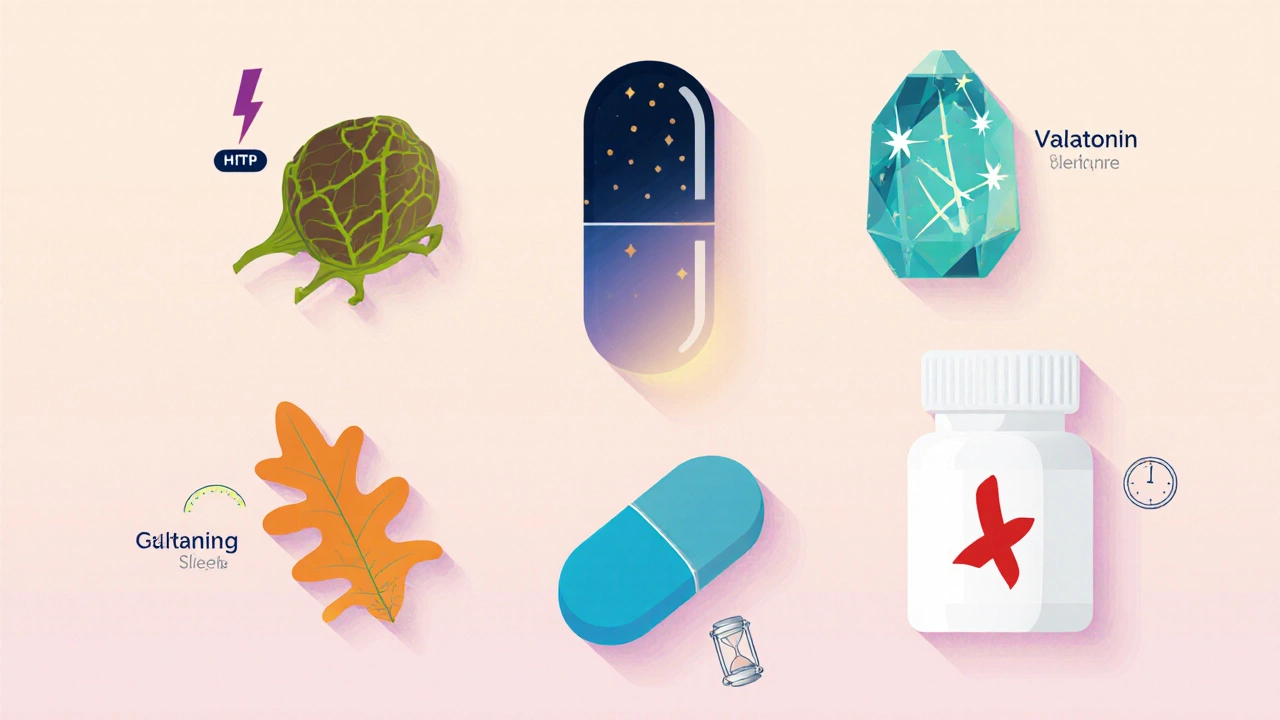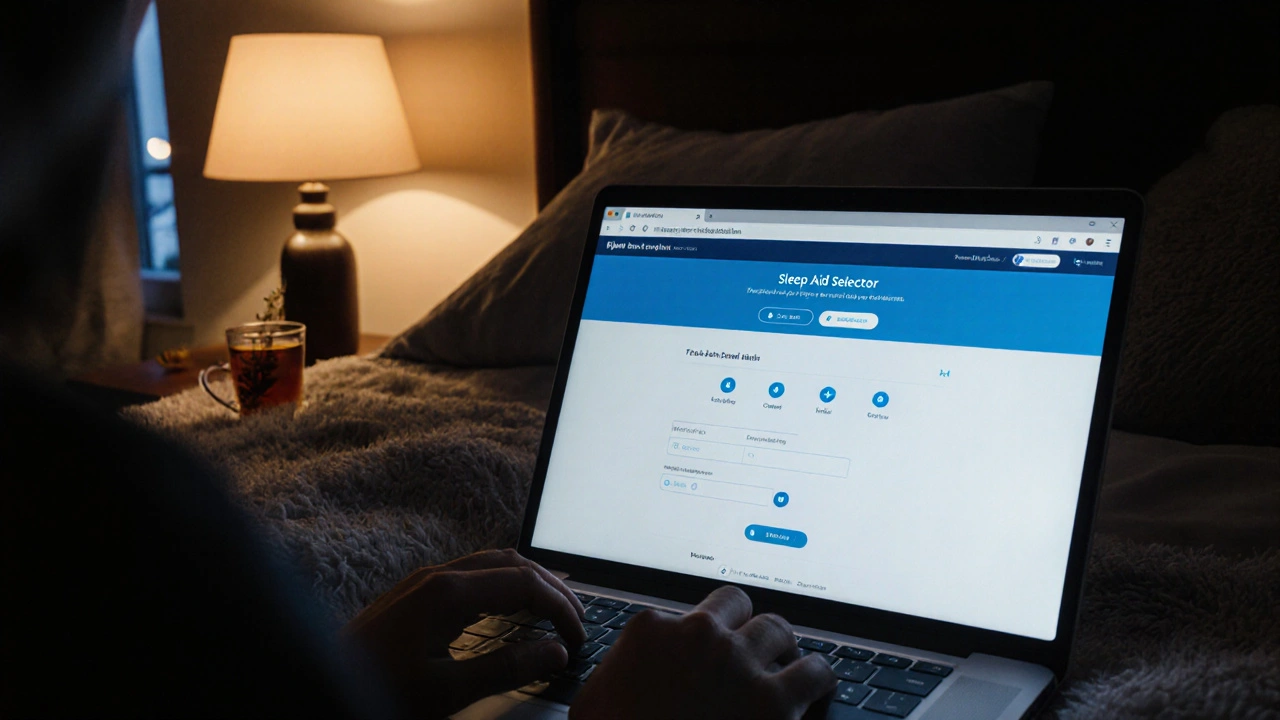Sleep Aid Selector
Find Your Best Sleep Aid
Answer a few questions about your sleep issues and preferences to get personalized recommendations.
Your Recommended Sleep Aid
Key Benefits
Important Notes
Quick Take
- Melatonin is a hormone that signals bedtime; it works best for minor sleep‑phase issues.
- Valerian root and 5‑HTP are plant‑based options that act on GABA and serotonin pathways.
- Magnesium glycinate helps relax muscles and calm the nervous system.
- Diphenhydramine (Benadryl) is an over‑the‑counter antihistamine with strong drowsiness but next‑day grogginess.
- Prescription drugs like zolpidem are powerful but carry dependency risks.
When it comes to natural sleep aids, melatonin is the most studied, but it isn’t a one‑size‑fits‑all solution. Below we break down how melatonin stacks up against five common alternatives, so you can pick the right tool for your nights.
What Is Melatonin?
Melatonin is a hormone produced by the pineal gland that helps regulate the body’s circadian rhythm. In darkness, levels rise, signaling the brain that it’s time to sleep. Supplements mimic this natural spike, making it easier to fall asleep when the internal clock is off.
Typical doses range from 0.3mg to 5mg taken 30-60minutes before bedtime. It’s short‑acting (onset within 20minutes, peak around 1hour) and generally clears the system within 4-6hours, so morning alertness is usually unaffected.
Why Look Past Melatonin?
Even though melatonin is safe for most adults, it doesn’t work for everyone. Common reasons people search for alternatives include:
- Insufficient effect on deep sleep stages.
- Need for a longer‑lasting sedative.
- Desire for a non‑hormonal option.
- Specific conditions such as restless legs or anxiety that melatonin doesn’t address.
Understanding what you need-quick onset, prolonged duration, anxiety relief, or muscle relaxation-guides you toward the best alternative.
Top Alternatives at a Glance
Here’s a snapshot of the five most popular substitutes, each with its own mechanism and ideal use case.
- Valerian root - herbal extract that enhances GABA activity, useful for mild anxiety‑related insomnia.
- Magnesium glycinate - a chelated mineral that relaxes muscles and calms the nervous system.
- 5‑HTP - precursor to serotonin, supports mood and sleep onset.
- Diphenhydramine - antihistamine with strong sedation, common in OTC sleep aids.
- Zolpidem - prescription hypnotic, fast‑acting, for chronic insomnia.

Side‑by‑Side Comparison
| Supplement | Onset | Duration | Typical Dose | Mechanism | Common Side Effects | Best For |
|---|---|---|---|---|---|---|
| Melatonin | 20‑30min | 4‑6hrs | 0.3‑5mg | Signals darkness to the brain | Drowsiness, rare vivid dreams | Jet lag, shift‑work, delayed sleep phase |
| Valerian root | 30‑60min | 6‑8hrs | 400‑900mg | Enhances GABA inhibition | Headache, mild stomach upset | Anxiety‑related insomnia, gentle night‑time calming |
| Magnesium glycinate | 45‑60min | 6‑8hrs | 200‑400mg elemental Mg | Muscle relaxation, NMDA modulation | Loose stools at high doses | Restless legs, muscle cramping, overall relaxation |
| 5‑HTP | 30‑45min | 5‑7hrs | 50‑300mg | Boosts serotonin → melatonin conversion | Nausea, rare serotonin syndrome with SSRIs | Mood‑linked sleep problems, low serotonin |
| Diphenhydramine | 15‑30min | 6‑8hrs | 25‑50mg | Blocks H1 histamine receptors, causes sedation | Dry mouth, next‑day grogginess | Occasional sleeplessness, need for strong drowsiness |
| Zolpidem | 15‑30min | 6‑8hrs | 5‑10mg (prescribed) | Enhances GABA‑A receptor activity | Memory lapses, dependence, morning sedation | Chronic insomnia, when OTC options fail |
How to Pick the Right Sleep Aid
Think of choosing a sleep aid like shopping for a mattress: you need to match the material (mechanism) to your body’s needs (symptoms) and budget (cost, side‑effects).
- Identify the problem. Is it trouble falling asleep, staying asleep, or waking up too early?
- Match the timing. For quick‑onset “lights‑out” needs, melatonin or zolpidem work best. For a gentle wind‑down, valerian or magnesium are smoother.
- Consider safety. If you’re on antidepressants, avoid 5‑HTP without doctor clearance. If you drive the next morning, skip diphenhydramine.
- Trial period. Start with the lowest recommended dose for 7‑10 nights. Track sleep latency, total sleep time, and morning alertness.
- Adjust or rotate. Some people benefit from a melatonin‑valerian combo (low dose each) to cover both phase shift and anxiety.
Safety, Interactions, and Who Should Avoid
All sleep aids carry caveats. Here’s a quick cheat sheet:
- Pregnant or nursing people: Stick with non‑pharmacologic habits; most supplements lack robust safety data.
- Children: Melatonin can be used under pediatric guidance, but valerian, diphenhydramine, and especially zolpidem are off‑limits.
- People on blood thinners: Magnesium may enhance anticoagulant effects.
- Those on SSRIs or MAOIs: 5‑HTP can raise serotonin too high, risking serotonin syndrome.
- Elderly: Prefer short‑acting agents (melatonin, low‑dose zolpidem) to limit next‑day fall risk.
Real‑World Tips for Better Sleep (Beyond Supplements)
No pill fixes a chaotic bedtime routine. Pair your chosen aid with these habits for optimal results:
- Dim lights an hour before bed - blue‑light screens raise melatonin suppression.
- Keep the bedroom cool (around 18‑19°C) - lowers core body temperature.
- Limit caffeine after 2pm - it can linger for up to 8hours.
- Practice a 5‑minute breathing or progressive‑muscle routine - primes the nervous system.
Frequently Asked Questions
Can I take melatonin every night?
Occasional use is fine, but daily long‑term use may blunt the body’s natural production. Many clinicians suggest a break after 1‑2months or using it only for specific disruptions like travel.
Is valerian safe to combine with melatonin?
Yes, at low doses. The combo can address both phase‑shift (melatonin) and anxiety (valerian). Start with half the usual dose of each and monitor for excess drowsiness.
Why does diphenhydramine make me groggy the next day?
Its antihistamine effect lasts longer than the sleep window, lingering in the bloodstream and slowing brain activity after waking.
Can magnesium help restless leg syndrome?
Many users report relief because magnesium relaxes muscles and supports nerve function. Aim for 200‑400mg elemental magnesium, preferably as glycinate to improve absorption.
Is zolpidem addictive?
It can be. Dependence risk rises after 2‑4weeks of nightly use. Doctors usually prescribe it for short bursts (≤4weeks) and monitor for cravings.
At the end of the day, the “best” sleep aid is the one that fits your schedule, health profile, and comfort level. Start low, track your nights, and adjust as needed-your body will tell you what works.








Posts Comments
Charlie Martin October 3, 2025 AT 23:39
I’ve found melatonin works best when you keep the dose under 1 mg for jet lag.
Danielle Watson October 14, 2025 AT 21:56
Magnesium helps calm restless leg syndrome and it’s cheap
Kimberly :) October 25, 2025 AT 20:13
While many tout valerian, its evidence base is actually thinner than that of 5‑HTP 😊
Sebastian Miles November 5, 2025 AT 17:30
GABAergic modulation via valerian offers a gentle sedative curve suitable for anxiety‑linked insomnia.
Harshal Sanghavi November 16, 2025 AT 15:48
Sure, you could keep popping Benadryl, but waking up feeling like a zombie is the glamour we all crave, right?
Duke Gavrilovic November 27, 2025 AT 14:05
From a cultural standpoint, many Eastern traditions have long relied on magnesium‑rich foods to promote nocturnal relaxation.
chris macdaddy December 8, 2025 AT 12:22
I recommend startin with a low dose of melatonin and track ur sleep quality for a weeek.
Moumita Bhaumik December 19, 2025 AT 10:39
The pharma industry hides the real benefits of natural sleep aids while pushing addictive pills like zolpidem to keep us dependent.
Sheila Hood December 30, 2025 AT 08:56
If you’re looking for a quick fix, diphenhydramine will knock you out, but expect a foggy brain at 9 am-great for that meeting.
Melissa Jansson January 10, 2026 AT 07:13
Cue the spotlight on 5‑HTP, the unsung hero that transforms serotonin deficits into dreamy nights, stealing the show from the usual suspects!
Max Rogers January 21, 2026 AT 05:30
When testing a new sleep aid, keep a sleep log for at least two weeks to compare latency and total sleep time accurately.
Louie Hadley February 1, 2026 AT 03:47
I hear the concerns about pharma influence, and I think it’s worth acknowledging that skepticism.
At the same time, the evidence for melatonin and magnesium is robust and not a conspiracy.
Both substances have been studied in randomized trials showing modest improvements in sleep latency.
What matters most is individual response, which can vary due to genetics, diet, and lifestyle.
If you have restless leg syndrome, magnesium glycinate is typically the first line before turning to prescription meds.
For jet lag, a short course of melatonin timed to the new night–day cycle works for most travelers.
Avoiding high doses of diphenhydramine is wise because the anticholinergic load can impair cognition the next day.
Prescription hypnotics like zolpidem should be reserved for chronic insomnia after other options have been exhausted.
A practical approach is to start with the lowest effective dose of a natural aid and monitor side effects.
Keeping a sleep diary helps you see patterns, such as whether you fall asleep faster on melatonin versus valerian.
Incorporating sleep hygiene-like dimming lights and limiting caffeine-amplifies any supplement’s benefit.
If anxiety is a factor, valerian or a low‑dose 5‑HTP combo can address the underlying nervousness.
Remember that supplements are not a license to ignore underlying medical conditions; consult a physician if symptoms persist.
Balancing benefits and risks is the key, and no single agent suits everyone.
So, consider your specific sleep issue, try a targeted natural aid, and only move to stronger medication if needed.
Ginny Gladish February 12, 2026 AT 02:05
While the balanced tone is appreciated, the claim that melatonin has a 'robust' evidence base overlooks the modest effect sizes reported in meta‑analyses.
Furthermore, the suggestion to start with the 'lowest effective dose' neglects the variability in absorption between individuals.
The emphasis on sleep diaries is sound, yet many users find them cumbersome and abandon them quickly.
Also, presenting magnesium as a first‑line treatment for restless legs may be premature without ruling out iron deficiency.
Overall, the advice is sensible but could benefit from citing specific study references.
Write a comment